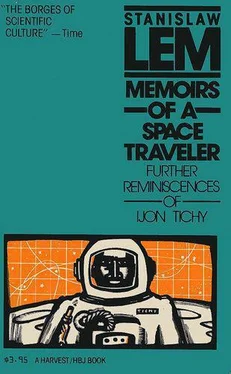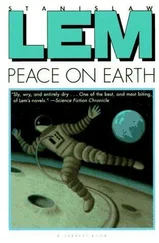Stanislaw Lem
MEMOIRS OF A SPACE TRAVELER
Further Reminiscences of Ijon Tichy
Translated by Joel Stern and Maria Swiecicka-Ziemianek
1) The Star Diaries
2) Memoirs of a Space Traveller: Further Reminiscences of Ijon Tichy
3) The Futurological Congress: From the Memoirs of Ijon Tichy
4) The Scene of the Crime
5) Peace on Earth
6) Local Inspection
The pieces in this book — the two Voyages of Ijon Tichy, his reminiscences, his open letter — all appeared in the 1971 Polish edition of Dzienniki gwiazdowe ( The Star Diaries ) but were not included in the British and American editions titled The Star Diaries and published in 1976. The present book, in effect, constitutes the second volume of Lem’s work of that name.
The expedition I want to write about now was, in its consequences and scale, the greatest of my life. I am well aware that no one will believe me. But, paradoxical as it may seem, the Reader’s disbelief will facilitate my task. Because I cannot claim that I achieved what I intended to achieve. To tell the truth, the whole thing turned out rather badly. The fact that it was not I who bungled, but certain envious and ignorant people who tried to thwart my plans, does not ease my conscience any.
So, then, the goal of this expedition was the creation of the Universe. Not some new, separate universe, one that never before existed. No. I mean this Universe we live in. On the face of it, an absurd, an insane statement, for how can one create what exists already and what is as ancient and irreversible as the Universe? Could this be — the Reader is likely to think — a wild hypothesis stating that till now nothing has existed except Earth, and that all the galaxies, suns, stellar clouds, and Milky Ways are only a mirage? But that’s not it at all, because I really did create everything, absolutely Everything — and thus Earth, too, and the rest of the Solar System, and the Metagalaxy, which would certainly be cause for pride, if only my handiwork did not contain so many flaws. Some of these lie in the building material, but most are in the animate matter, particularly in the human race. This has been my greatest regret. True, the people I shall mention by name interfered in my efforts, but by no means do I consider myself thereby absolved. I should have planned, supervised, seen to everything more carefully. Especially since there is now no possibility for correction or improvement. Since October 20 of last year, I am to blame for all — and I mean all — the constructional defects in the Universe and the warps in human nature. There is no escape from that knowledge.
It all began three years ago, when through Professor Tarantoga I met a certain physicist of Slavic descent from Bombay. A visiting professor. This scientist, Solon Razglaz, had spent thirty years in the study of cosmogony, that branch of astronomy that deals with the origin and early formation of the Universe.
Razglaz reached, after a thorough study of the subject, a conclusion that stunned even him. As we know, theories of cosmogony can be divided into two groups. One comprises those theories that regard the Universe as eternal — in other words, devoid of a beginning. The second holds that at one time the Universe arose in a violent manner, from the explosion of a Proto-atom. There have always been difficulties with both views. Regarding the first: Science possesses a growing body of evidence that the visible Universe is from twelve to twenty billion years old. If something has a definite age, there is nothing simpler than to calculate back to its zero moment. But an eternal Universe can have no “zero,” no beginning. Under the pressure of new information, most scientists now opt for a Universe that arose from fifteen to eighteen billion years ago. Initially there was a substance — call it Ylem, the Proto-atom, whatever — that exploded and gave rise to matter and energy, stellar clouds, spiral galaxies, and dark and bright nebulae, all floating in rarefied gas filled with radiation. This can be precisely and neatly determined as long as no one asks, “But where did the Proto-atom come from?” For there is no answer to this question. There are certain evasions, yes, but no self-respecting astronomer is satisfied with them.
Professor Razglaz, before taking up cosmogony, had for a long time studied theoretical physics, particularly the so-called elementary particles. When his interest switched to the new subject, he quickly saw that the Universe unquestionably had a beginning. It obviously arose 18.5 billion years ago from a single Proto-atom. At the same time, however, the Proto-atom from which it sprang could not have existed. For who could have placed it in that emptiness? In the very beginning there was nothing. Had there been something, that something, it is clear, would have begun developing at once, and the entire Universe would have arisen much earlier — infinitely earlier, to be exact! Why should a primordial Proto-atom remain inert, waiting motionless for unknown eons? And what in God’s name could have wrenched it so, in that one moment, causing it to expand and fly apart into something so tremendous?
Learning of Razglaz’s theory, I often questioned him about what led to his discovery. The origin of great ideas has always fascinated me, and surely it would be hard to find a greater revelation than Razglaz’s cosmogonic hypothesis! The professor, a quiet and extremely modest man, told me that his concept was, from the viewpoint of orthodox astronomy, quite outrageous. Every astronomer knows that the atomic seed from which the Universe is supposed to have sprung is a highly problematical thing. What do they do about this, then? They sidestep, they evade the issue, because it is inconvenient. Razglaz, on the other hand, dared to devote all his energy to it. The more he amassed facts, and the more he rummaged through libraries and built models, surrounding himself with a battery of the fastest computers, the more clearly he saw that there was something not right.
At first he hoped that eventually he would succeed in diminishing the contradiction, and perhaps even in resolving it. However, it kept increasing. Because all the data indicated that the Universe arose from a single atom, but also that no such atom could have existed. Here an obvious explanation suggested itself, the God hypothesis, but Razglaz set it aside as a last resort. I remember his smile when he said, “We shouldn’t pass the buck to God. Certainly an astrophysicist shouldn’t…” Pondering the dilemma for many months, Razglaz reviewed his previous research. Ask any physicist you know, if you do not believe me, and he will tell you that certain phenomena on the smallest scale occur, as it were, on credit. Mesons, those elementary particles, sometimes violate the laws of conservation, but they do this so incredibly fast that they hardly violate them at all. What is forbidden by the laws of physics they do with lightning speed, as though nothing could be more natural, and then they immediately submit to those laws again. And so, on one of his morning strolls across the university campus, Razglaz asked himself: What if the Universe were doing the same thing on a large scale? If mesons can behave impossibly for a fraction of a second, a fraction so minuscule that a whole second would seem an eternity in comparison, then the Universe, given its dimensions, might behave in that forbidden way for a correspondingly longer period of time. For, say, fifteen billion years…
It arose, then, although it might well have not arisen, there being nothing from which to arise. The Universe is a forbidden fluctuation. It represents a momentary aberration, but an aberration of monumental proportions. It is no less a deviation from the laws of physics than, on the smallest scale, a meson! Suspecting he was on the right track, the professor immediately went to his laboratory and made some calculations, which, step by step, verified his idea. But even before he had finished, the realization came: the solution to the riddle of the origin of the Universe revealed a threat as great as could be imagined.
Читать дальше












